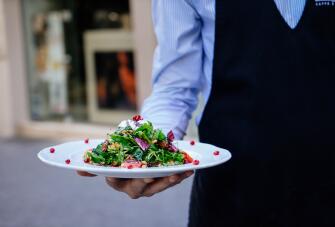How to Start a Food Truck Business
Food trucks are still a big trend. They’re exciting and profitable, and many entrepreneurs are looking to get in on the action.
Before you start a food truck business, you will need to do a ton of planning. Although trucks and trailers are much smaller than restaurants, they demand just as much dedication and care to be successful.
To help you in this process, we’ve compiled this extensive guide on starting a food truck!
Follow These Nine Steps to Start a Food Truck Business
According to RestaurantMBA, 60% of food trucks fail within the first three years of operation. Poor planning may be a key reason why these businesses close, so you need to prepare if you want to succeed. That said, you’ve already started doing your research since you are reading this article!
Cross each of these items off your list, and you can start your food truck in an excellent position.
Evaluate your market
Where do you live and where do you plan to operate? It goes without saying that you cannot sell something if nobody is buying, so you need to be sure there is enough demand for a food truck. Since you’ll have a kitchen on wheels, you can always drive to metropolitan areas if your locale doesn’t have sufficient demand.
As you do your market research, be sure to check out the competition. What kind of food trucks exist and what do they sell? How do you feel about their prices? Try to learn as much as you can about your competition and see how you can carve out a piece of the market.
The market can actually have so much competition that it becomes saturated. If there are too many similar food trucks, none will do well. Even if you think the market is too competitive, don’t worry! You can always look for a food or snack that no one else offers and capitalise on it.
Think about your interests and offerings
What food do you want to provide? Do you cook it better than anyone else? Think about your menu and how difficult it will be to prepare meals.
Some items, like burgers and tacos, are relatively straightforward to cook, making them a perfect food truck food. Some complicated menu items, however, may require many utensils and extensive preparation. Cooking these dishes in your food truck will be quite the struggle.
People expect food trucks to offer meals that are easy to eat on the go. Perhaps these dishes come in a bowl or are stuck between pieces of bread. Whatever you offer, be sure that it will not be too overwhelming. But if you must serve your one-of-a-kind meal, consider placing tables outside your truck to make dining easier.
Finally, how much does it cost to produce your meals? If you want to serve a pricier food like lobster or salmon, then your customers will need to pay more too. Having a menu that is too expensive could hurt your business, so be sure to keep it affordable and similar in price to competitors.
Make a business plan
All small businesses should have a business plan, no questions asked. Without one, you may overlook a crucial aspect of starting a food truck. Read this helpful guide from the Small Business Administration to get started.
You will want to go over your business plan with an expert once you get it in order. Try to find another successful small business owner who can review it and provide feedback. You want to learn from their mistakes so you can avoid any mishaps.
Get funding
How will you finance your food truck? Most people are not sitting on piles of money, so they will need to find funding to get their business off the ground.
Here are a few options:
- Business loans: If you can qualify for a business loan, then this option may help you get started quickly. One downside is the debt obligation, so you will need to make enough sales to cover your costs
- Bootstrapping: Perfect for taking things slowly, bootstrapping lets you pay for the business out of pocket. It will take longer to start your food truck because you will need to save money and then buy equipment over time
- Investors: If you don’t mind giving up some stake in the business, you can show investors your business plan and get funding quickly. They can also provide strategy and more capital to offer more than you originally planned
Get your business legal
Operating without proper licenses and permissions is not smart. In some places, police have even cited children for operating lemonade stands without a license.
Where do you plan on selling your food? Cities and states will likely have different regulations, so speak with your local authorities to make sure you are in compliance.
Health and safety are also imperative. Make sure to speak with your local department of health to schedule inspections and ensure you are meeting any licensing requirements.
You also want to consider how you will incorporate your food truck to protect yourself and your business. You may want to create a sole proprietorship, partnership, or a limited liability company (LLC). Each of these has its advantages and downsides, so consider your plans to choose which fits best.
Find a truck
Your truck will make or break your business since prices range from $50,000 to $250,000. You want something that is large enough to prep your food but small enough to get in and around cities.
The first consideration is buying new or used. The differences between these are similar to buying any other vehicle. A new truck comes at a higher price but provides assurance that all parts are in working order. A used truck is less expensive, but you never know what is broken or how well the engine will perform.
Find suppliers
Now that you have your menu, business model, and truck, it’s time to find your food suppliers. If you know you will be serving homemade chili, you will want a partner who can ensure a steady supply of beef, beans, spices, and more.
If you will not be selling high volumes of food, you may be able to get your supplies from a wholesale location like Costco or Sam’s Club.
Once you start selling more, however, you won’t want to spend time going to the store. Instead, you can have food delivered to your business, but this comes with a different challenge — where will you store your goods?
Choose your POS system
How do you plan on processing orders and collecting payments? On average, customers are carrying less and less cash, so you will want to accept credit and debit payments. For these reasons, your truck needs a point of sale system.
Additionally, your system can help you manage your food truck better. It can track orders, monitor inventory levels, and integrate with accounting software.
The Epos Now system is perfect for food trucks because of its versatility and powerful integrations. You can take orders with a tablet or mobile device, store all data in the cloud, and even operate if you lose internet connection. Customers can get receipts sent straight to their email address, so you don’t have to worry about a paper printer.
Hire Staff and Get Started
Food trucks don’t require large teams, so hiring should not be a challenge. The Epos Now system is intuitive and easy to use, so training new hires takes minutes. Even better, you can do payroll and track employee hours with your system.
Schedule a call with a consultant to learn more about the Epos Now system!



